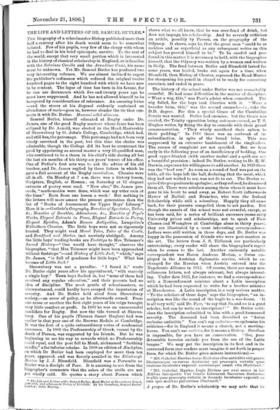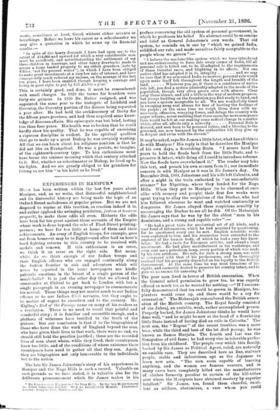THE LIFE AND LETTERS OF DR. SAMUEL BUTLER.*
TIM biography of a schoolmaster-Bishop published more than half a century after his death would seem to be somewhat belated. Few of his pupils, very few of the clergy with whom he had to deal in his brief episcopate, survive. To the rest of the world, except that very small portion which is interested in the history of classical scholarship in England, or is familiar with the Sa,brinae Corolla and the Arundines Cami, his name must be unknown. Yet Mr. Samuel Butler has produced two very interesting volumes. We are almost inclined to regret the publisher's ordinance which reduced the original twelve hundred pages to the eight hundred with which we have now to be content. The lapse of time has been in his favour, for he can use documents which five-and-twenty years ago he must have suppressed. And he has not allowed himself to be hampered by considerations of relevance. An amusing letter —and the stores at his disposal evidently contained an abundance of such—goes in, however slender the tie that con- nects it with Dr. Butler. Humani nihil alienum.
Samuel Butler, himself educated at Rugby under Dr. James, one of the good Rugby masters whose fame has been eclipsed by Dr. Arnold, was elected to the Head-Mastership of Shrewsbury by St. John's College, Cambridge, which had, and still has, the patronage. This patronage had not been very wisely exercised in the past, but this time the choice was admirable, though the College did its best to counteract the good by appointing as second master a very ill-qualified man, who continued to be a thorn in his chief's side during all but the last six months of his thirty-six years' tenure of his office. One of Butler's first acts was to ask the advice of his old teacher, and Dr. James replied by three letters in which he gave a full account of the Rugby curriculum. Classics were all in all. On Monday at 7 a.m. there was a history lesson, Scripture, English, or Roman ; on Saturday at 12 elegant extracts of poetry were read. "Now also," Dr. James pro- ceeds, "mathematics were done, which was my utter ruin at the time." Ruin from one lesson a week ! But nothing in the letters will more amaze the present generation than the list of " Books of Amusement for Upper Boys' Library." Here it is :—Gnthrie's Geography, Beauties of Spectator, Tatter, &c., Beauties of Rambler, Adventurer, &c., Beauties of Pope's Works, Elegant Extracts in Prose, Elegant Extracts in Poetry, Elegant Epistles, Adam's Roman Antiquities, Lempriere's Bibliotheca Classica. The little boys were not so rigorously treated. They might read Moral Tales, Tales of the Castle, and Sandford and Merton not unwisely abridged). Among the little boys' reading-books are Footsteps to Mrs. Trimmer's Sacred History—" One would have thought," observes the biographer, "that Mrs. Trimmer might have been approached without footsteps "—and History of Little Jack, "which," says Dr. James, "is full of goodness for little boys." What has become of Little Jack ?
Shrewsbury was not a paradise. " I found it," wrote Dr. Butler eight years after his appointment, "with scarcely a single boy." Town boys flocked in, but "none of them had received any regular education," and their parents had no idea of discipline. The most gentle of schoolmasters, so circumstanced, could hardly have escaped the imputation of severity. And Dr. Butler held aloof from Shrewsbury society,—an error of policy, as he afterwards owned. From one cause or another the first eight years of his reign brought very little comfort or profit. In 1806 he was an unsuccessful
candidate for Rugby. But now the tide turned at Shrews- bury. One of his pupils (Thomas Smart Hughes) had won earlier in that year one of the Browne Medals at Cambridge.
It was the first of a quite extraordinary series of academical successes. In 1808 the Professorship of Greek, vacant by the death of Porson, was suggested by his friends. But he was beginning to see his way to rewards which no Professorship could equal, and the post fell to Monk, nicknamed "farthing candle," a far inferior scholar. In 1809 an edition of tEschylus, on which Dr Butler had been employed for more than ten years, appeared, and was fiercely assailed in the Edinburgh Review by J. J. Blomfield. Blomfield was a Porsonite as Butler was a disciple of Parr. It is amusing to see from the biographer's comments that the ashes of the strife are not yet wholly cold. He quotes a story about Porson which
• The Life an d Letters of Dr. Samuel Butler, Read-Master of Shrewsbury School, 1798-1516, and afterwards Bishop of Lichfield. By his Grandson, Samuel Butler. London : John Murray.
shows what we all know, that he was over-fond of drink, but does not impugn his scholarship. And he severely criticises an article, possibly by Porson, on the geography of the Odyssey. It shows, says he, that the great man "could be as reckless and as superficial as any subsequent writer on this subject has proved himself to be." To be careful and pro- found in this matter it is necessary to hold, with the biographer himself, that the Odyssey was written by a woman and written in Sicily. The feud between Butler and Blomfield lasted for some years, was healed, broke out again for a time, when Blomfield, then Bishop of Chester, reproved the Head-Master for sharpening his pencil in chapel to be ready for correcting exercises, and ended in peace.
The history of the school under Butler was not remarkably eventful. He had some difficulties in the matter of discipline. " Wear a wig, thir," was Parr's advice when consulted. The wig failed, for the boys took liberties with it. " Wear a broader brim, thir," was the second counsel,—i.e., take the D.D. degree. For this a special Grace of the Cambridge Senate was wanted. Butler had enemies ; but the Grace was carried, the Trinity opposition being out-manceuvred, as T. S. Hughes writes, by fixing the day to coincide with their grand commemoration. " They wisely sacrificed their spleen to their pudding." In 1818 there was an outbreak of in- subordination, in spite of the broad brim. This was suppressed by an extensive banishment of the ringleaders.
The causes of complaint are not specified. But we hear early in the following year of an insufficiency of bedding. One good upper-blanket (with another under) and a quilt are not a bountiful provision ; indeed Dr. Butler, writing to Dr. R. W. Darwin, expresses his willingness to add another. In 1829 there was the " beef row." As soon as a round of beef was put on gm table, all the boys left the hall, declaring that the meat, which they had not waited to see, was not fit to eat. The Doctor re.
quired the prwpositors to apologise; as they refused, he dismissed them all. There were scholars among them whom it must have gone to his heart to send away, as Robert Scott (afterwards Master of Balliol) and Brancker, who won the Ireland Scholarship while still a schoolboy. Happily they all came back, for their parents compelled them to ask pardon. But though the annals of the school were not eventful, except, as has been said, for a series of brilliant successes (some sixty University prizes and scholarships, not to speak of First Classes and Wranglers at Cambridge alone in thirty years), they are illustrated by a most interesting correspondence. Letters were still written in those days, and Dr. Butler was happy in the possession of friends who were past-masters in the art. The letters from J. S. Tillbrook are particularly entertaining; every reader will share the biographer's regret when he comes to the last. Another eminently notable correspondent was Baron Andreas Merian, a. Swiss em- ployed in the Austrian diplomatic service, which he ex- changed for the Russian when Austria entered into the Napoleonic Alliance in 1812. Of course, there are many mis- cellaneous letters, not always relevant, but always interest- ing. Under date 1823, for instance, we find a correspondence with a Nonconformist minister about a Latin inscription which he had been requested to write for a brother minister at Manchester. A Latin inscription is a very serious matter. "To the scholars of those days," says the biographer, "an in- scription was like the sound of the bugle to a war-horse.. ' It is all very well,' said Dr. Parr, say that So-and-so is a good scholar, but can he write an inscription P" Dr. Butler criti- cises the inscription submitted to him with a good-humoured severity. The deceased had been described as " huiqs ecclesiae antistitis." You can't say ecclesiae—we epitomise his criticism—for in England it means a church, not a meeting- house. You can't use antistes, for it means a Bishop. SaceRutn is impossible, for you have no consecration. "See, your detestable heresies exclude you from the use of the Latin tongue." We may put the inscription in its first and in its corrected form (our readers must imagine it set forth in proper form, for which Dr. Butler gives minute instructions) :—
" MS. Guhelmi Hawkes buius Ecclesiae olim antistitis yin gravis literarumque sacrarum doctissimi qui praecepta virtntis quae oratione luculenter exposuit acerrimeque suasit vita illustravit."
" MS. Guhelmi Hawkes Legie Divinae per xxxi annos in bin .7Edibus Interpretis Viri Gravis Literarum Sacrarum doctissimi is aliis quae praecepta virtutis in docendo Inculenter exposnit on snis ipse moribus pulcerrime illustravit."
A propos of Dr. Butler's scholarship we may note that he
wrote, sometimes at least, Greek without either accents or breathings. Before we leave his career as a schoolmaster we may give a quotation in which he sums up its financial results :- " In spite of the heavy demands I have had upon me, to the extent of £14,000 and upward (of which a very considerable sum must be sacrificed), and notwithstanding the settlement of my three children in marriage, and other heavy drawbacks made to secure a large landed property to my eldest grandson [note by Editor, 'not the present writer '], in which I have been obliged to make groat investments at a very low rate of interest, and have consequently much reduced my income, on the average of the last ten years, 1 have been enabled, though keeping a carriage and living in good style, to put by full £4,000 a year."
This is certainly good, and done, it must be remembered, with small charges. In 1820 the terms for boarders were forty-six guineas. In 1836 Dr. Batter resigned, and was appointed the same year to the bishopric of Lichfield and Coventry, the Coventry portion of the diocese being separated a year after. He had held the archdeaconry of Derby for
the fifteen years previous, and had thus acquired some know- ledge of diocesan affairs. His episcopate was but brief, lasting
less than four years. His health was so broken that he could hardly show his quality. That he was capable of exercising a vigorous discipline is evident. In the spiritual qualities that go to make up a great Bishop be was certainly wanting. All that we can learn about his religious position is that he did not like an Evangelical. He was a prelate, we imagine, of the eighteenth-century type. To him enthusiasm must have borne the sinister meaning which that century attached to it. But, whether as schoolmaster or Bishop, he lived up to
his lights. And we are greatly obliged to his grandson for letting us see him "in his habit as he lived."























































 Previous page
Previous page